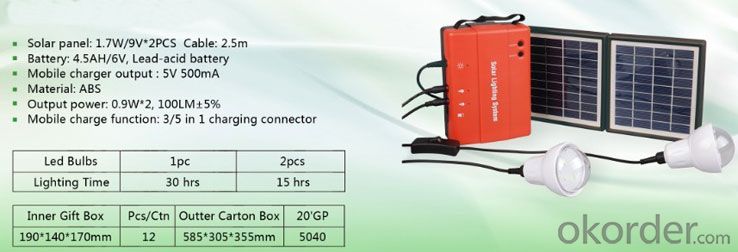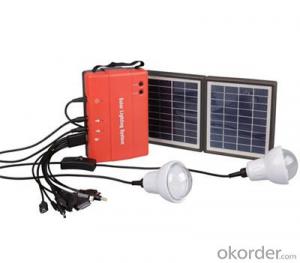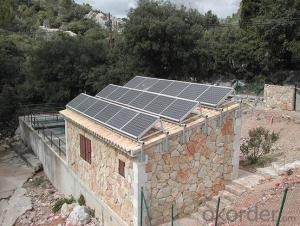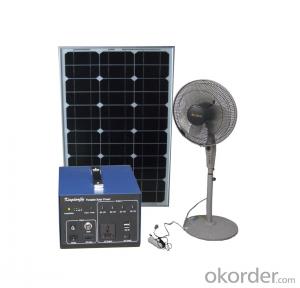MINI SOLAR LIGHTING SYSTEM
- Loading Port:
- Guangzhou
- Payment Terms:
- TT OR LC
- Min Order Qty:
- -
- Supply Capability:
- 10000 unit/month
OKorder Service Pledge
Quality Product, Order Online Tracking, Timely Delivery
OKorder Financial Service
Credit Rating, Credit Services, Credit Purchasing
You Might Also Like
Description:
Portable Solar Lighting System With 2 Lights
1, Foldable solar panels
3, USB mobile charging
Rechargeable by 3.4W solar panel
Body Material: ABS+PC
Battery: 4.5AH/6V Lead acid
Lighting time: 15 hours working after fully charged for 2 bulbs
Overcharge, over dischargeprotection controller
Accessory: 2 pcs of 0.9W LED bulbs with 5M long line cord each

- Q:Can solar energy systems be used in powering fire stations or police stations?
- Solar energy systems have the capability to power fire stations and police stations, offering a renewable and sustainable power source that is both reliable and cost-effective. These facilities necessitate a consistent and uninterrupted power supply for crucial functions such as lighting, communication, security systems, and other essential equipment. To harness sunlight and convert it into electricity, solar panels can be installed on rooftops or nearby areas. This electricity can then be utilized to power the various electrical systems within these establishments. By employing solar energy, fire stations and police stations can decrease their dependency on traditional grid electricity, reduce operational costs, and contribute to a greener environment. Moreover, solar energy systems can incorporate battery storage to accumulate excess electricity generated during the day, ensuring an uninterrupted power supply even during periods of low sunlight or at night. Overall, solar energy systems are a practical and feasible option for powering fire stations and police stations, endorsing energy independence and sustainability for these vital public service institutions.
- Q:Are there any safety concerns with solar energy systems?
- Yes, there are some safety concerns associated with solar energy systems. These concerns include potential electrical hazards during installation or maintenance, fire risks due to faulty wiring or improper installation, and the release of hazardous materials during the manufacturing or disposal of solar panels. However, it is important to note that these risks can be minimized through proper installation, regular maintenance, and adherence to safety standards and regulations.
- Q:Can solar energy systems be used for powering off-grid research stations in Antarctica?
- Yes, solar energy systems can be used for powering off-grid research stations in Antarctica. Solar panels can be installed to capture and convert sunlight into electricity, which can then be stored in batteries for use during periods of low or no sunlight. This renewable energy source can provide a reliable and sustainable power supply for the research stations, reducing the dependence on fossil fuels and minimizing environmental impact.
- Q:Are there any risks of electrical shocks during installation or maintenance of solar energy systems?
- Yes, there are risks of electrical shocks during the installation or maintenance of solar energy systems. These risks can occur due to the high voltage of the system, improper grounding, faulty wiring, or inadequate safety precautions. It is crucial to follow proper safety procedures, use appropriate personal protective equipment, and ensure that qualified professionals handle the installation and maintenance to minimize the risk of electrical shocks.
- Q:Do solar energy systems require a backup power source during outages?
- No, solar energy systems do not require a backup power source during outages. Solar panels generate electricity from sunlight and can continue to provide power even when the grid is down. However, if the solar system is grid-tied, it may shut down automatically during an outage to prevent sending electricity back to the grid, in which case a backup battery or generator can be used to provide power.
- Q:Can solar energy systems be used in extreme weather conditions?
- Yes, solar energy systems can be used in extreme weather conditions. However, their efficiency may be affected to some extent depending on the severity of the weather.
- Q:Can solar energy systems be used in powering concert halls or auditoriums?
- Yes, solar energy systems can be used to power concert halls or auditoriums. These systems can be installed on the rooftop or nearby areas to harness sunlight and generate electricity. The generated solar power can then be used to run the lighting, sound systems, and other electrical equipment required for concerts or performances. Additionally, solar energy systems can be integrated with battery storage solutions to ensure a continuous power supply, even during periods of low sunlight or at night.
- Q:Can solar energy systems be used in powering street cameras or surveillance systems?
- Street cameras and surveillance systems can indeed be powered by solar energy systems. Solar energy is a reliable and independent source of power that is sustainable and renewable. To utilize solar energy, one can install solar panels on rooftops or mount them on poles near the cameras. These panels capture sunlight and convert it into electricity, which can then be stored in batteries. This stored electricity can be used to power the cameras and surveillance systems even when sunlight is scarce or at night. By utilizing solar energy for street cameras and surveillance systems, we not only reduce our reliance on traditional power sources but also contribute to reducing carbon emissions and minimizing our overall environmental impact. Moreover, solar-powered systems prove to be cost-effective in the long run as they eliminate the need for expensive cabling and provide a self-sustaining energy solution. In conclusion, solar energy systems are an excellent choice for powering street cameras and surveillance systems due to their sustainability, reliability, cost-efficiency, and environmental friendliness.
- Q:Are there any risks of electromagnetic radiation with solar energy systems?
- Yes, there are minimal risks of electromagnetic radiation with solar energy systems. Solar panels generate direct current (DC) electricity, which does not emit electromagnetic fields (EMF) or radiation. However, some components of solar energy systems, such as inverters or power conditioning units, convert DC electricity to alternating current (AC), and may produce low levels of EMF. These levels are typically well below the safety limits set by regulatory bodies and pose no significant health risks to humans.
- Q:Can solar energy systems work during cloudy or rainy days?
- Yes, solar energy systems can still work during cloudy or rainy days, although their efficiency may be reduced. While direct sunlight is optimal for generating electricity from solar panels, they can still generate power from diffused or scattered sunlight that passes through the clouds. However, the amount of electricity generated will be less compared to sunny days. Some advanced solar technologies are designed to maximize power production even in low light conditions, ensuring a certain level of energy generation even on cloudy or rainy days.
1. Manufacturer Overview |
|
|---|---|
| Location | |
| Year Established | |
| Annual Output Value | |
| Main Markets | |
| Company Certifications | |
2. Manufacturer Certificates |
|
|---|---|
| a) Certification Name | |
| Range | |
| Reference | |
| Validity Period | |
3. Manufacturer Capability |
|
|---|---|
| a)Trade Capacity | |
| Nearest Port | |
| Export Percentage | |
| No.of Employees in Trade Department | |
| Language Spoken: | |
| b)Factory Information | |
| Factory Size: | |
| No. of Production Lines | |
| Contract Manufacturing | |
| Product Price Range | |
Send your message to us
MINI SOLAR LIGHTING SYSTEM
- Loading Port:
- Guangzhou
- Payment Terms:
- TT OR LC
- Min Order Qty:
- -
- Supply Capability:
- 10000 unit/month
OKorder Service Pledge
Quality Product, Order Online Tracking, Timely Delivery
OKorder Financial Service
Credit Rating, Credit Services, Credit Purchasing
Similar products
New products
Hot products
Hot Searches
Related keywords



























